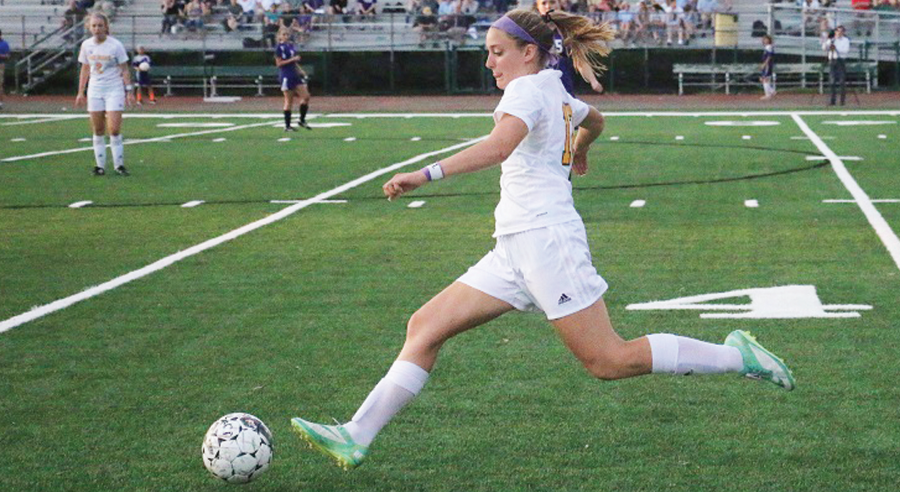[dropcap]R[/dropcap]eceiving a cancer diagnosis during freshman year of college and being far from home is what most people might consider their worst nightmare. This nightmare recently became reality for 2016 alumna Ronni Farid.
Shortly after returning to George Washington University in Washington D.C. after winter break, Farid noticed something she could never have prepared herself for: a tumor.
“I was sitting in class one day and felt a lump on my neck. I knew something was wrong, so I called my dad,” Farid said. “He told me to trace the lump with a Sharpie and watch it over the next week to see if it grew at all. When it was noticeably growing, I called my parents, and they flew me home to meet with an oncologist. The next day I was diagnosed with cancer, and that was it.”
Farid learned she had Stage II Lymphoma, a cancer of the lymphatic system. While she had a 90 percent chance of defeating the illness, there was the possibility that something could go terribly wrong. Every eight minutes, a young adult receives a cancer diagnosis, totaling more than 60,000 that will battle the disease each year, according to the American Cancer Society. Of the 60,000 young adults, 9,000 will lose the fight.
During her treatment, Farid would often walk on the track at RBHS after the final bell rung, regardless of the commotion. She said it was the “best of both worlds.” She used this opportunity to get the social interaction that she felt she was lacking while she was home for the semester, as well as enjoying the weather.
“I didn’t want to be a couch potato,” Farid said. “I promised myself that I would go on a walk every day, no matter if I was feeling like I didn’t want to do it or not.”
Before she graduated, Farid served on Student Council for four years, played soccer and tennis and maintained good grades. Because of her busy nature, she promised herself that she would remain busy throughout the treatment. Surgical oncologist and medical director of Ellis Fischel Cancer Center Dr. Eric Kimchi said productivity is beneficial for cancer patients.
[quote]“Anything a person can do to keep normalcy in their life is extremely beneficial for both their mental and physical health,” Kimchi said. “Many new studies are being released showing that patients that have positive attitudes have stronger immune systems, therefore increasing their quality of life.”[/quote] Farid was a three-year RBHS varsity soccer player during her time and had developed a bond with many of the younger returning players. After her diagnosis, she lingered around practice before a light bulb went off in her head.
“I texted Coach Gary Drewing and asked him if I could come to practice and visit a little bit with some of the players I used to play with and help out,” Farid said. “Of course, he welcomed me with open arms. Eventually, I became an honorary manager, and now I shag balls for them at practice when they need it. It’s something really positive in my life right now. It allows me to feel like I’m a part of something, even when I’m away from school. I also get my exercise in, which is always nice.”
Twenty percent of all young adults diagnosed with cancer each year develop clinical depression or anxiety disorders caused by stress because of the potentially terminal nature of the disease. While it is likely that the devastating diagnosis of cancer may send a patient into isolation and eventually lead to depression, Farid wanted to defy the odds.
“I chose optimism, and yes, it is a choice,” Farid said. “Yes, cancer is hard. I’m not saying there aren’t hard days because they’re inevitable. Chemo[therapy] is exhausting, and there’s no way around it. You’re going to have to go through it somehow, and I would much rather go through it with a positive attitude. You need to learn to laugh at yourself. It makes the hard times a lot easier.”
Her positivity has been something her family has embraced. Following Farid’s optimistic approach, her family members and close friends will not speak of death.
“It’s not like I’m afraid of dying,” Farid said. “It’s that I would much rather focus my energy on coming out of this hardship alive. There is no reason for me to consume myself with the thought of death when I could surround myself with positivity, at least not one that I’ve found yet.”
When Farid’s family gathered to celebrate Easter together this year, it was the first holiday since her lymphoma diagnosis. Instead of having the awkward conversations that come along with cancer, Farid lightened the mood and had fun.
“Since I have lost all of my hair with chemotherapy treatments, I decided to paint my bald head like an Easter egg and hide in the bushes as if I were a really big egg . It was so fun to paint as well as surprise my family members with.”
Returning to the soccer field for one more season is not what Farid planned for or expected when she stepped off the field after her last home game as a senior. But like the past four months of her life, she has learned that nothing in life goes as planned.
“If there’s one thing I know for certain,” Farid said. “We can’t control the situations we’re put in. We can only control how we handle them.”













































































